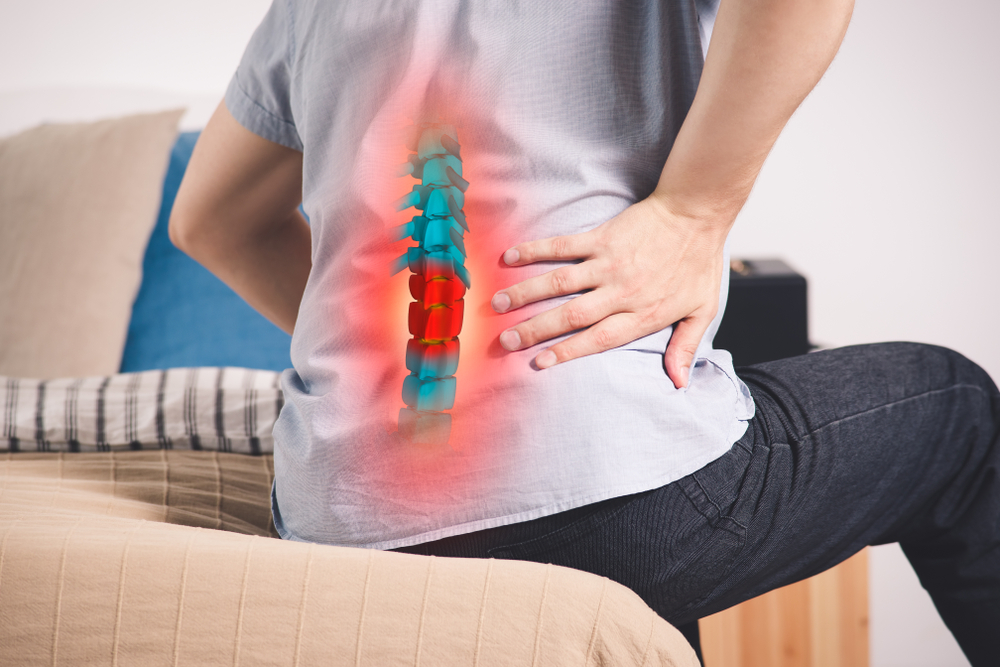When it comes to dealing with lower back pain, there are a variety of conditions that can result in restricted movement and discomfort.
One such condition is a herniated disc which will, fortunately, often heal on its own.
However, effective treatments will help alleviate the pain and discomfort caused by a herniated disc.
Keep reading to learn more about herniated discs and how they can be fixed:
What is a Herniated Disc?
A herniated disc is a condition that occurs when a portion of your spinal disc is pushed out of place and into the spinal canal.
Your spinal discs cushion the vertebrae in your spine and when it is pushed into the small space of the spinal canal, it presses on the nerves and produces pain.
A herniated disc can occur in any part of the spine but most commonly happens in the lower back but it can also happen in the neck area.
What Causes a Herniated Disc?
Herniated discs are often caused by the gradual wear and tear of the disc called “disc degeneration.”
This most commonly occurs in aged individuals with less flexible spine discs.
However, anyone at any age can experience a slipped disc and the exact cause often cannot be pinpointed.
Apart from natural degeneration, a herniated disc can occur if an individual habitually lifts heavy objects with their back instead of their leg and thigh muscles.
Certain risk factors are involved with herniated discs, such as weight, occupation, genetics, smoking, frequent driving, and being sedentary throughout the day.
If you are at risk of herniating a disc, are aging, or simply want to avoid the ordeal altogether, there are certain things you can do to prevent a herniated disc:
- Maintain good posture to reduce the pressure on your spine and discs. Ensure you are keeping your back straight and aligned, especially during prolonged periods of sitting.
- Lift heavy objects with your leg and thigh muscles instead of your back.
- Maintain a healthy weight to reduce excess pressure on your spine.
- Exercise to strengthen your trunk and core muscles. This will help stabilize and support your spine.
Herniated Disc Symptoms
While many people do not experience symptoms of having a pinched nerve in the lower back or neck, those who do will notice pain and discomfort on one side of their body.
Where the slipped disc has occurred and whether or not it is pressing against a nerve will determine the specific symptoms felt by the individual.
Here are some common symptoms of a herniated and bulging disc:
Pain and Discomfort
When a herniated disc occurs in the lower back, you will likely feel pain in your lower back that radiates down through your buttocks, thigh, and calf. You may also feel pain in your foot as well.
However, if the slipped disc has occurred in your neck, you will feel the most pain in your shoulder and arm.
If you are experiencing pain and discomfort from a herniated disc, you may notice shooting pain through your arm or leg whenever your sneeze, cough, or move into certain positions.
This pain is often described as being sharp or burning.
Tingling and Numbness
Apart from pain, you may experience numbness or tingling radiating from the affected body part by the pressed nerve.
Weakness
The muscles surrounding the pinched nerve in the lower back or neck tend to weaken, which can cause you to stumble and experience difficulties holding or lifting objects.
Herniated Disc Treatment
Before treatment can begin for a herniated disc, a diagnosis of the condition must be made.
This may involve checking your reflexes at the knee and ankle, testing your leg strength, and checking whether or not you can feel light touches or vibrations.
Your doctor may want to pinpoint the specific nerves affected by the slipped disc by doing further testing such as an x-ray, CT scan, or MRI.
Rest and Pain Relief
When it comes to herniated disc treatment, the first step is rest.
You need to take it easy for a few days to relieve swelling and allow your back time to heal. Avoid exercises and any other activities that involve bending or lifting.
You can use ice and heat to help relieve your pain during this time.
Over-the-counter pain relievers such as ibuprofen or naproxen can also be used to alleviate the pain and reduce swelling. Talk to your doctor before taking any medications.
Physical Therapy
There are certain exercises that can help alleviate the symptoms of a bulging disc but these should only be done under the guidance of a trained physiotherapist.
If you are experiencing the pain of a slipped disc and seeking herniated disc treatment, we can help!
Our expert team at River Stone Wellness will work together to find the best treatment course to alleviate the pain and get you back to living your life.
Come visit us at our Physiotherapy Edmonton clinic or book your appointment online!


